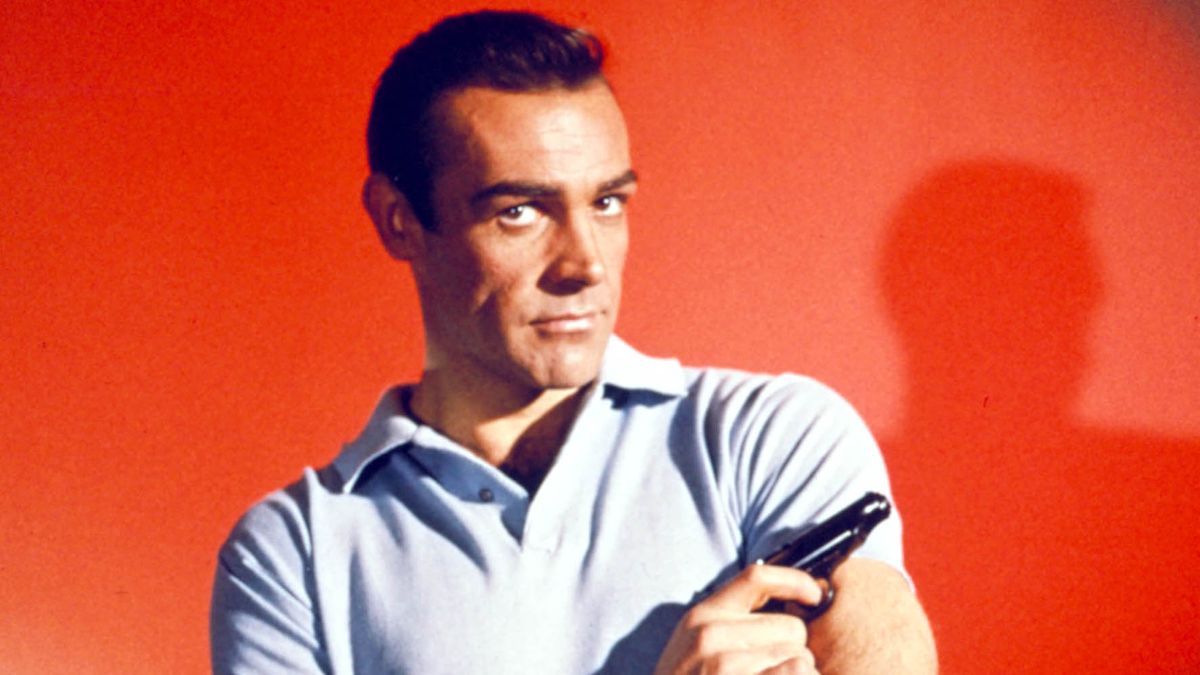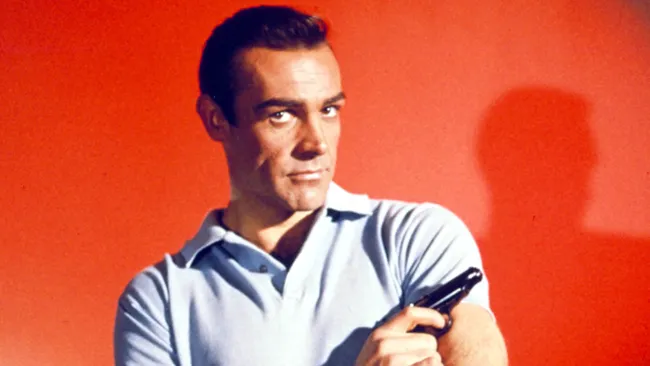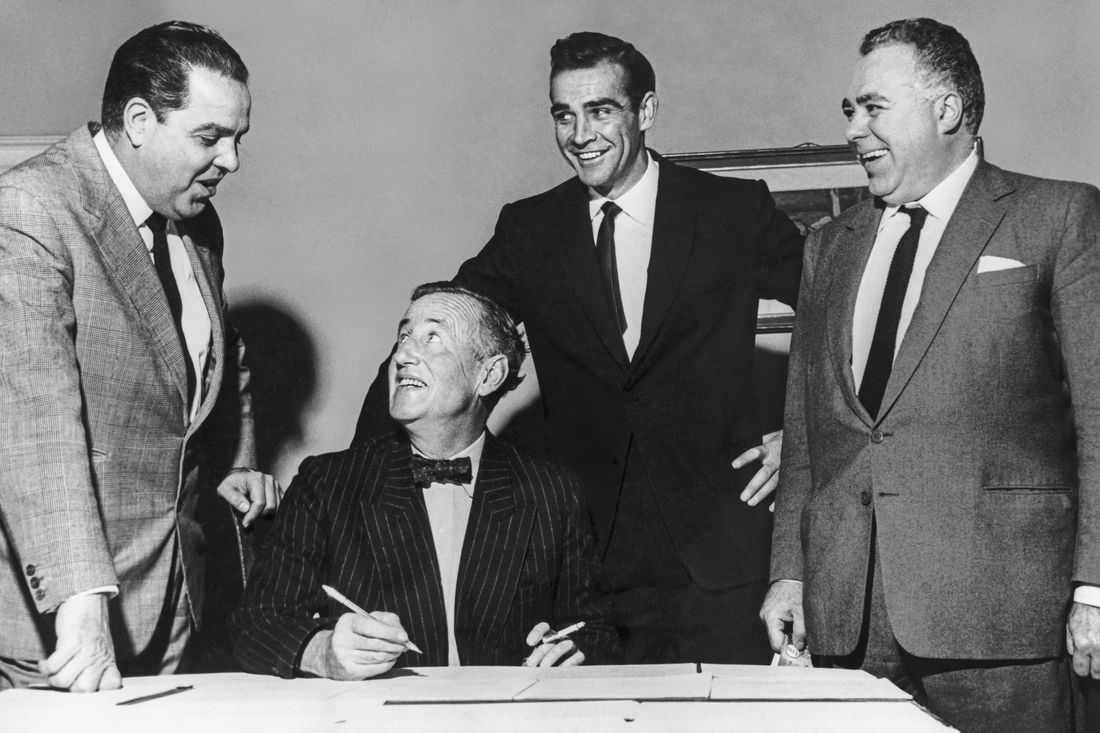Install the app
How to install the app on iOS
Follow along with the video below to see how to install our site as a web app on your home screen.

Note: This feature currently requires accessing the site using the built-in Safari browser.
-
New here? Register here now for access to all the forums, download game torrents, private messages, polls, Sportsbook, etc. Plus, stay connected and follow BP on Instagram @buckeyeplanet and Facebook.
You are using an out of date browser. It may not display this or other websites correctly.
You should upgrade or use an alternative browser.
You should upgrade or use an alternative browser.
What is your favorite James Bond movie?
- Thread starter tibor75
- Start date
DaiMonMoore
Heisman
Looks like the next movie won't be coming anytime soon

 deadline.com
deadline.com

James Bond Producers “Not Even Started” Planning Next Chapter – But It Will Be On The Big Screen
James Bond’s many fans will have a long wait for the next 007, it seems. Producer Barbara Broccoli has revealed that executives haven’t even begun to map out the next chapter of the long-running fr…
Upvote
0
I’ve probably watched every Bond movie numerous times and I really hated the last movie. I’ve only watched it once. Killing Bond off was absolutely stupid in my book unless that’s the end of it.
It will be interesting to see if they even produce another one,
It will be interesting to see if they even produce another one,
Upvote
0
Greyshirt
All-American
I’ve probably watched every Bond movie numerous times and I really hated the last movie. I’ve only watched it once. Killing Bond off was absolutely stupid in my book unless that’s the end of it.
It will be interesting to see if they even produce another one,
I am very concerned the direction they are taking the franchise.
I watch Bond for pure entertainment. I am concerned the next Bond will be female and then I will be furious. I did like most of the Daniel Craig movies as it kind of added feelings to Bond and a bit more character building. And I liked the less sexist version. Do not get me wrong. I like me some Sean Connery Bond. But the direction they took the character made sense and modernized the movies.
And I was OK with Bond dying. I mean we all know 007 is just a moniker. It makes sense there have been many and for sure some die.
Upvote
0
calibuck
Too soon old, too late smart
Well sure. As each 007 'ages out' or somesuch, a new Bond steps up. Such is the way the world turns. Liked some more than others, and even enjoyed the Bond parody with David Niven and Woody Allen stepping in. Agree with Greyshirt that a female Bond might disrupt perceptions of the heavy drinking, fast driving, womanizing James Bond......but in this new world, who's to judge?
Upvote
0
ORD_Buckeye
Wrong glass, Sir.
Broccoli said once that, because of the Austin Powers movies, they absolutely had to reinvent Bond with Craig. Mike Myers killed the old Bond.I am very concerned the direction they are taking the franchise.
I watch Bond for pure entertainment. I am concerned the next Bond will be female and then I will be furious. I did like most of the Daniel Craig movies as it kind of added feelings to Bond and a bit more character building. And I liked the less sexist version. Do not get me wrong. I like me some Sean Connery Bond. But the direction they took the character made sense and modernized the movies.
And I was OK with Bond dying. I mean we all know 007 is just a moniker. It makes sense there have been many and for sure some die.
Upvote
0
To me Bond…James Bond…was synonymous with 007. In Goldfinger he says if I die they’ll replace me with 008.I am very concerned the direction they are taking the franchise.
I watch Bond for pure entertainment. I am concerned the next Bond will be female and then I will be furious. I did like most of the Daniel Craig movies as it kind of added feelings to Bond and a bit more character building. And I liked the less sexist version. Do not get me wrong. I like me some Sean Connery Bond. But the direction they took the character made sense and modernized the movies.
And I was OK with Bond dying. I mean we all know 007 is just a moniker. It makes sense there have been many and for sure some die.
I was surprised they gave the 007 to the lady in No Time to Die. They never gave 007 to someone else, when he supposedly died in Skyfall.
Upvote
0
Upvote
0
ScriptOhio
Everybody is somebody else's weirdo.

Why Sean Connery was chosen as James Bond for Dr. No — and why he stubbornly refused to perform a screen test
Sean Connery also helped inject wit into Bond
 www.whattowatch.com
www.whattowatch.com
Why Sean Connery was chosen as James Bond for Dr. No — and why he stubbornly refused to perform a screen test
Sean Connery also helped inject wit into Bond
Sean Connery was not the first choice to play James Bond. To be more accurate, he wasn't everyone's first choice to play the suave spy in Dr. No, the first movie in what would become cinema's most successful franchise.
Indeed, Bond author Ian Fleming wanted David Niven to play his creation. Ironically, Niven did indeed play Bond but in the 1967 spoof Casino Royale. Meanwhile, producer Albert "Cubby" Broccoli liked the idea of Hollywood legend Cary Grant taking the part. After all, Grant was the best man at Broccoli's wedding. However, the actor only wanted to do one movie, which would leave Broccoli with the problem of having to recast the role after Dr. No. Grant also would have been 58, and so thankfully for lovers of Sean Connery, Grant turned down the role.
Another star firmly in the running was Danger Man's Patrick McGoohan. Amazingly McGoohan turned the role down for moral reasons. It's hard to imagine an actor today refusing a part on moral grounds, but Broccoli wrote in his autobiography that the actor couldn't square the part with his religious beliefs. While Terence Young, who directed Dr No., wanted Shakespearean actor Richard Johnson to play Bond.
But eventually, thoughts turned to a certain young Scottish actor...
.
.
.
continued
‘That’s Our Bond!’
What it took to turn a little-known, working-class actor named Sean Connery into the high-living, suave James Bond.

Producer Cubby Broccoli, author Ian Fleming, actor Sean Connery, and producer Harry Saltzman at the Eon production offices before Dr.No began filming.
It took years of trying before a proper film adaptation of a James Bond novel was finally produced, with the release of Dr. No in 1962. Along the way, there were false starts, abandoned suitors, and an author, Ian Fleming, who was very particular about what could be done to his work and by whom. The biggest question of all, of course, was who would play Agent 007; producers Harry Saltzman and Albert “Cubby” Broccoli had come to United Artists with a plan to make a whole series of Bond films, so whoever got the part would have to be able to carry multiple movies. Taschen’s massive new book James Bond. Dr. No, written and edited by Paul Duncan, offers an intriguing and colorful journey into the production of the first James Bond movie. The book is filled with detailed script notes, production memos, and call sheets — not to mention more than a thousand images — that take us behind the scenes of the film. Perhaps the most fascinating story in it, however, concerns how a relatively little-known actor by the name of Sean Connery got the part of Bond. In this exclusive excerpt, Duncan tells the tale of Connery’s casting as well as how director Terence Young took the working-class actor under his wing and schooled him in how to actually play the high-living, suave Bond.
My books,” said Ian Fleming, “tremble on the brink of corn. One has to be very careful.”
United Artists announced the deal with producers Albert “Cubby” Broccoli and Harry Saltzman on June 29. Although Variety reported that either Dr. No or Diamonds Are Forever would be the first James Bond novel to be filmed, the producers wanted to film Ian Fleming’s most recent and most successful novel, Thunderball, the rights to which they had been led to believe would be made available soon. However, United Artists had different ideas. According to company chief David Picker, “Harry and Cubby pushed for Thunderball, but it was clear that since we were only prepared to risk a certain amount of money on these movies, Dr. No was the one to do first. It was the cheapest one to make.”
Four days later Bud Ornstein of United Artists’ London office sent production company EON a £3,000 check as an advance to Wolf Mankowitz to write the script for the first film, Dr. No, which they hoped to begin shooting before the end of the year. Cubby explained, “Harry and I decided that, since Wolf Mankowitz was a fine writer and had acted as the marriage broker in our partnership, he deserved to have a crack at the screenplay.” At the same time, they hired Richard Maibaum to write the second film, Thunderball, and, as per Maibaum’s assignments with Warwick, arranged for him to travel from Hollywood to live in London so he could be near the producers while he worked.
With work on the scripts in progress, Cubby admitted, “We now had the toughest problem of all: finding the actor to play James Bond.”
“Actors are falling over themselves to play Bond,” Harry told the press. “It’s the acting plum of the decade. Everyone’s been after it. Cary Grant, David Niven, Trevor Howard, and James Mason are interested. Hitchcock wanted to buy it for Cary Grant, and Jimmy Woolf tried to buy it for Larry Harvey. But I guess my timing just happened to be right. I’m also thinking about Michael Craig and Patrick McGoohan, but I’d prefer to use an unknown, as we did with Saturday Night and Sunday Morning.”
“Fleming’s physical descriptions of James Bond were very well drawn,” Cubby explained. “Fleming gives Bond’s height as a little over six feet, his weight as around 167 pounds, and his build slim. Furthermore, the various descriptions confirm that Bond possesses ‘dark, rather cruel good looks,’ and that women find him devastatingly irresistible. Well, we had our blueprint, but where was there an actor to fit it?
“I felt that we had to have an unknown actor, not a star; above all, a man you’d believe could be James Bond. Our theory was that if we cast a virtually unknown actor, the public would be more likely to accept him as the character. Also, we wanted to build the actor into the role so that he would grow with it and wouldn’t complain if we wanted him to do several more Bonds. Patrick McGoohan had been suggested [he was starring as secret agent John Drake in the TV series Danger Man], and might have made a fine Bond. But he was strongly religious and was uneasy about sex and violence. James Fox was also put forward, but he, likewise, was reluctant because of strong religious scruples.
“Roger Moore [then starring in American TV show Maverick] had also been touted as a possible Bond. But at that time I thought him slightly too young, perhaps a shade too pretty. He had what we called the ‘Arrow collar’ look: too buttoned-down smart.
“While all the discussions about the casting of Bond were going on, one face kept coming back into my mind. It belonged to an actor I had met briefly a few years before in London. He was Sean Connery, who at that time was making a film with Lana Turner, Another Time, Another Place (1958). He was a handsome, personable guy, projecting a kind of animal virility. He was tall, with a strong physical presence, and there was just the right hint of threat behind that hard smile and faint Scottish burr.
“Back in Hollywood I had arranged to see the only footage available on him, Darby O’Gill and the Little People (1959), at Goldwyn Studios [on June 28, 1961]. I phoned Dana to come down to see the picture. Dana’s reaction was immediate: ‘That’s our Bond!’ She thought he would be absolutely ideal for the role. I knew that her judgment was spot-on. I phoned Harry and told him to run some film on Sean, call his agent, and invite the actor to our office in London to meet us on my return.”
In June 1961, Sean Connery had finished filming the comedy On the Fiddle at Shepperton Studios, where he played a soldier with the strength of five men but the brains of only half of one, and was rehearsing Tolstoy’s Anna Karenina for the BBC with Claire Bloom in the title role. Peter Hunt, the editor of On the Fiddle, remembered, “One night the producer Ben Fisz and myself and a group of people were having dinner in the Polish Club, and Harry Saltzman came into the club with his new wife. We all sat together and that was when Harry said he was going to make this James Bond film and was looking for a James Bond. Ben Fisz suggested that maybe Sean would make a good James Bond. We were well into the film and on the way to dubbing it, so I sent up a couple of reels to Harry’s office.”
Harry remembered looking at several of Connery’s early films. “He was dreadful in most of them, we thought. He had suffered a small but fatal miscasting all the way down the line.”
Harry, Cubby, and Bud Ornstein waited for their potential star. Connery arrived wearing baggy trousers, loafers, and a five o’clock shadow. “Connery walked into our office and had a strength and energy about him, which I found riveting,” Cubby recalled. “Physically, and in his general persona, he was too much of a rough cut to be a replica of Fleming’s upper-class secret agent. This suited us fine, because we were looking to give our 007 a much broader box-office appeal: a sexual athlete who would look great in Savile Row suits but with the lean midriff of a character who starts his day with 20 push-ups. Everything about Connery that day was convincingly James Bond. Harry and I asked him a lot of questions. His answers, in that very appealing Scottish accent of his, were friendly and direct. There was no conceit to him and no false modesty, either. He didn’t come on in the style of a classical actor who thought James Bond was a little too down-market for his talents.
“There was, though, a slight change of tone in him when we got around to talk about specifics: the image we wanted to create and the money he expected to earn. Everybody accepted that, on a strictly limited production budget, big salaries were out. When we explained this to Sean the discussion became very lively. He started hammering the desk, his accent becoming even broader: ‘I want fooking so much or I won’t do the fooking picture! I won’t work for fooking nothing!’ And so forth. It was quite a performance. Privately, I was quite amused by it. And I gather that Sean himself admitted sometime later that it had been a bit of an act. But it all ended in a friendly way. We agreed on his salary, and he walked out happy.”
.
.
.
continued
Just sayin': Interesting stories of the beginning of the James Bond Movies. Like the case in many other movies*, the person that got picked for the lead role went on to become a hit in the role; however, he/she wasn't their first choice choice for the part.
* Apparently Daniel Craig wasn't their first choice for Casino Royale either; it was Hugh Jackman, he declined because he was told he wouldn't have any say in the script. "I just felt at the time that the scripts had become so unbelievable and...they needed to become grittier and real," he told Variety. "I was also worried that between Bond and X-Men, I’d never have time to do different things." However, when Daniel Craig accepted the role afterward, the produces agreed to let him "try and reinvent" Bond.
Upvote
0

